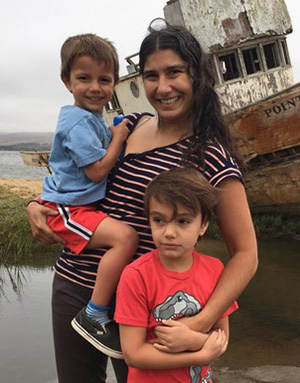A group of female academics is calling on scientific conferences to do more to accommodate nursing mothers and parents, and to help normalize parenthood in academia by removing a significant barrier to women beginning their careers in science.
“Nursing and childcare, most often provided by women, are not a luxury; they are a biological necessity,” said Rebecca Calisi Rodriguez, an assistant professor of neurobiology, physiology and behavior at UC Davis and organizer of a Working Group of Mothers in Science.
In an article published March 5 in Proceedings of the National Academy of Sciences, the working group set out some simple steps conference organizers can take to make conferences more family-friendly.
Needhi Bhalla, associate professor of molecular, cell and developmental biology at UC Santa Cruz, said she and the other 45 women in the group have all had to struggle with difficult decisions involving childcare and attendance at scientific meetings.
"By providing important and concrete policy suggestions, this article provides a useful template for the organizers of scientific conferences to implement and ensure a more diverse, inclusive, and equitable conference experience for all attendees," Bhalla said. "It's a great example of how women can work together to come up with solutions to what seems like a major barrier we've all faced."
Attending conferences is often vital for academic scientists. The conferences provide a place for sharing new research and ideas, forming collaborations, recruiting students and postdoctoral scholars, and making contacts with funding agencies. But they often lack adequate facilities and resources for parents. Many times, onsite childcare is not provided, and when it is, it is not affordable for those starting their careers. Dedicated spaces for nursing and lactation are either non-existent or insufficient.
This all poses a challenge for new parents, especially women. Women offer the majority of childcare due to biological (pregnancy and breastfeeding), prejudicial (pre-existing gender bias), and often socially driven demands. Not offering appropriate resources or support for these women to attend conferences may harm their careers and reduce diversity in academic science. In the long run, it harms the whole scientific enterprise by keeping talented people out.
The situation is slowly improving, but there is still a lot of room for improvement, Calisi said. At a recent conference with over 30,000 attendees, she found just three small, curtained areas for nursing and childcare.
“To argue that this is better than nothing is akin to arguing that, despite a hostile work environment, women should be grateful that they are allowed to work in the first place,” she said.
The article offers guidelines that organizers can use for conferences of all sizes and different types of venues.
“As academics who have cared for, adopted, birthed, primary parented, or breastfed a baby, while pursuing a career in science, we have compiled four concrete suggestions… for scientific societies and conference organizers willing to take a leadership role in creating solutions, either incrementally or on a large scale,” the authors write.
Their recommendations are set out under the acronym CARE: supporting Childcare, either onsite or at home through financial support; Accommodating families with family friendly dates, venues, and schedules; providing Resources, such as lactation, nursing, and baby-changing areas; and Establishing a conference-specific social network where parents and caregivers can schedule activities, organize babysitting and childcare swaps, share information, and provide emotional support for each other.
Making scientific conferences more family-friendly would send a message that the organizers recognize the challenges parent-scientists face, that working parents (especially working mothers) are valued, and that they want to encourage a diverse and thriving scientific workforce. The authors noted that their guidelines are applicable not only to conferences, but to workplace settings in general.
Mothers in science offer solutions to the conference-childcare conundrum
Working group proposes guidelines for scientific conferences to remove barriers for parents

Biologist Needhi Bhalla with her children, Elias (8) and Kiran (5). Bhalla is a member of the Working Group of Mothers in Science. (Photo courtesy of N. Bhalla)


